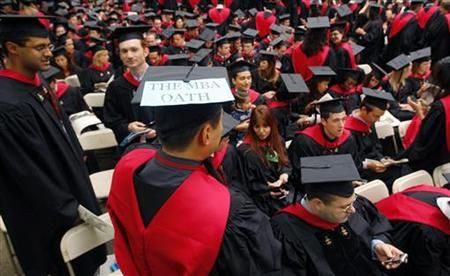How To Spend $2 Million And Still Not Get Your Kids Into Harvard

If you think New York parents are neurotic about getting their kids into Harvard, try talking to Gerald and Lily Chow, the Hong Kong couple who just spent $2.2 million over four years on a tutoring service that promised an acceptance letter, only to have both of their sons rejected from the oldest Ivy League school.
The Chows have now filed suit against the tutoring agency, the Boston Globe reported.
The suit reads, “Gerald and Lily Chow have sought the best educational opportunities for their children. They decided in 2006 that their sons … would benefit most by being educated in the top schools in the United States. Having no knowledge of the educational system in the United States, they engaged an educational consultant to assist them with the selection of appropriate ... schools in the United States and the admission process.”
The American college system can be a maze to foreigners, especially the Chinese, where school admissions are largely based on test scores. The educational consultant the Chows used, called IvyAdmit, claims to be “the worldwide leader in Business School and competetive [sic] University admissions consulting for international applicants.”
Apparently the blatant misspelling on the front page of IvyAdmit’s website didn’t tip off the Chows, because upon meeting Mark Zimny, the founder of IvyAdmit, at their oldest son’s 2007 swanky private middle school graduation, they quickly began forking over the dollars.
Zimny introduced himself to them as a current Harvard professor, and told the Chows that he had “high level connections with individuals in the development offices of … Ivy League colleges and … he could use his school connections to assist them in gaining admission to the top tier schools,” the suit reads.
The court documents reveal that Zimny told the Chows that making large contributions to their schools of choice would raise their sons’ chances of acceptance, but only if the money was contributed through IvyAdmit, as Ivy League schools often treat foreign students as “second class” and are naturally suspicious of “individuals or organizations that are unknown or untested to them.”
The Chows ended up paying Zimny $4,000 per month per son, on top of tuition and room fees for their oldest son at boarding school and home stay expenses for their younger child. In early January and March 2008, the Chows also wired Zimny an extra $75,000 and $80,000, respectively, for their school “contributions.” That summer they deposited $1 million for each son with IvyAdmit to keep Zimny as a retainer tutor. Zimny told them that the money would be pooled with “similar Asian families … to help their sons and daughters gain admission to the colleges of their choices in the Unites States.”
The suit also charges that in the summer of 2009, Zimny suggested that the Chow boys attend an SAT tutoring camp, and that he would pay for room and board and bill the parents later. He charged them three times the actual tuition cost for the camp.
Finally in the fall of 2009, Gerald Chow approached the headmaster of the school where his younger son was a student and asked if the school had received any of the contributions Zimny had promised to make. The headmaster said that “no such contribution had been received,” and also told Chow that the school had no affiliation with Zimny. In 2010 the Chows requested their money back from Zimny. Zimny refused.
The suit against Zimny charges fraud, breach of fiduciary duty, breach of contract, and unjust enrichment, among other charges. Zimny has reportedly denied some of the charges and admitted to others.
It is still unclear exactly where the Chows' money went. Court documents obtained by the Globe say Zimny and his colleagues did tutor the two sons, even doing schoolwork for them at times.
“While it is certainly possible that in individual cases an admissions consultant can be helpful to an applicant,” Jeff Neal, a Harvard spokesman, wrote in a statement to The Crimson, “we have encountered no evidence to indicate that is the case generally. More importantly, our process — and the very wide range of information we collect about applicants — is designed to give us the broadest possible view of their qualifications, regardless of whether they used a consultant or not.”
Michael Goran, the director of IvySelect College Consulting, told The Crimson, the student newspaper, that most clients pay between $5,000 and $6,000 and prices above $15,000 are rare.
The story has a somewhat happy ending, the Globe said. The Chow sons did end up at undisclosed “top schools” – just not Harvard.
© Copyright IBTimes 2025. All rights reserved.






















